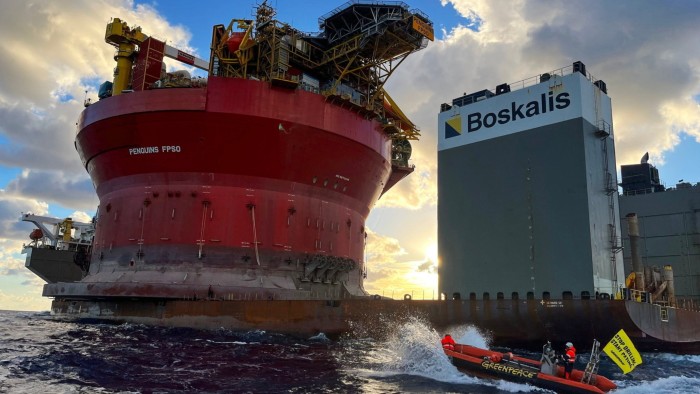Unlock the Editor’s Digest for free
Roula Khalaf, Editor of the FT, selects her favourite stories in this weekly newsletter.
Shell and Greenpeace have settled one of the largest legal claims against the environmental group, brought after protesters occupied a Shell floating production unit near the Shetland Islands in 2023.
Under the terms of the settlement, Greenpeace will donate £300,000 to the charity Royal National Lifeboat Institution after Shell argued that the protest had endangered its crew at sea.
The environmental campaign organisation shook off the case by framing it as an attack by a big polluter on freedom of speech and by weaponising it to humorous effect, but faces similar attacks from other fossil fuel producers.
Greenpeace nicknamed the Shell case the “Cousin Greg” lawsuit after a scene in the drama Succession in which a character threatens to sue the campaign group. The series’ creator Jesse Armstrong donated $25,000 to Greenpeace’s legal fund and actors including Emma Thompson and Stephen Fry also joined the campaign.
Areeba Hamid, co-executive director of the campaign group in the UK, said the settlement was evidence of “people power” that attracted increased donations and concern from its supporter base.
“Shell thought suing us for millions over a peaceful protest would intimidate us, but this case became a PR millstone tied around its neck.”
Shell, which recently won an appeal in The Hague against a landmark order for it to cut greenhouse gas emissions, framed the case as a defence of the safety of its technical staff members.
The company said it was “pleased that the dispute has been settled and that a payment in lieu of the costs it incurred can benefit a charity working on safety at sea”.
The oil and gas major had previously offered to settle if Greenpeace agreed not to take any action against Shell’s installations at sea or port anywhere in the world. Greenpeace rejected this, but has agreed to not come within 500 metres of four Shell platforms in the North Sea for at least five years.
Its protesters used ropes and harnesses to board and scale one of Shell’s floating production, storage and offloading vessels while it was being transported in the Atlantic Ocean last year.
They displayed a yellow banner with the slogan “stop drilling, start paying”, in reference to Shell’s new oil and gas projects, and to the idea that profits from the sale of fossil fuel products could be put towards climate adaptation and mitigation.
Greenpeace said it had faced over $11mn in damages and legal costs as a result of the lawsuit, that it accepted no liability and would pay no money to Shell.
But the campaign group is still fighting similar cases, as the backlash by fossil fuel producers against shareholder activism and campaigning groups grows.
Greenpeace faces an “existential threat” to its presence in the US due to being sued by US pipeline company Energy Transfer over 2016 protests, it said. Italian oil major Eni also filed a lawsuit against Greenpeace in October.



